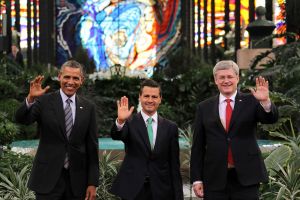Survey results show that American and Mexican governments have some challenges in order to shift public attention to North American trade and energy cooperation.
Introduction
The recent North American Summit in Toluca, Mexico, occurred 20 years after the United States, Canada, and Mexico linked their economies together with the North American Free Trade Agreement (NAFTA). Perhaps fittingly, then, the discussions this year focused more on trade than on the security issues that have typified previous agendas. US President Barack Obama, Mexican President Enrique Peña Nieto, and Canadian Prime Minister Stephen Harper pledged to advance trilateral integration on energy, improve transportation infrastructure, and make border crossings more efficient. But the leaders were light on the details, and they barely touched on the continuing problems related to drugs, crime, and migration— issues that are the dominant concerns among the US and Mexican publics. In fact, Mexico has a growing image problem among Americans, whose negative views of the country are largely based on narcotics trafficking, crime, and to a lesser extent, undocumented immigration.
These are some of the findings from a pair of surveys conducted by The Chicago Council on Global Affairs in partnership with Centro de Estudios Sociales y de Opinión Pública (CESOP), Centro de Investigación y Docencia Económicas (CIDE), Instituto Tecnológico Autónomo de México (ITAM), and the Mexico Institute at the Woodrow Wilson Center. While the Toluca meeting focused on trilateral cooperation, a recent Mexico Institute report, Is Geography Destiny?, states that nearly all of the key issues affecting North America are being addressed either independently by one of the three countries or in a dual-bilateral framework. These surveys thus focus on public attitudes on the US-Mexico relationship.
Key Findings
- Two decades since the implementation of NAFTA, Americans and Mexicans have grown more positive about the impact of NAFTA on their countries. But both—and especially Americans—still think the other country benefits more from the deal.
- Both publics tend to think the two countries are working in the same direction on trade and economic development. But Mexicans are much more likely than Americans to recognize the magnitude of the trading relationship between the two countries.
- While both Mexicans and Americans think bilateral relations are good and important, there is less consensus on whether the United States and Mexico are working “in the same direction” on combating drug trafficking, enforcing border security, and combating organized crime.
- Both publics want their governments to place a greater emphasis on security over economic issues.
- A majority of Mexicans continue to express a positive view of the United States, though it is down somewhat from previous surveys. On the other hand, American views of Mexico are at their lowest level since 1994, with fewer than four in ten viewing it favorably.
- One out of every two Americans surveyed has visited Mexico. Two out of every ten Mexicans have been to the United States. Travel across the border tends to correlate positively with favorable opinions of the other country and the economic ties between them.
- Americans are more positive toward Mexicans living in Mexico than Mexicans living in the United States. This is likely because of the association among some Americans with undocumented immigration. Both publics believe that immigrants who cross the border without legal documents do so in order to improve their living standards.
Methodology
The Chicago Council on Global Affairs partnered with Centro de Estudios Sociales y de Opinion Publica (CESOP), Centro de lnvestigacion y Docencia Economicas (CIDE), lnstituto Tecnologico Autonomo de Mexico (ITAM), and the Woodrow Wilson Center's Mexico Institute to carry out opinion surveys in both Mexico and in the United States prior to the North American Summit of February 19, 2014.
The Mexican survey was conducted by Universidad Nacional Autonoma de Mexico (UNAM) on behalf of CESOP and is based on face-to-face interviews con ducted December 11 to 16, 2013, among a nationwide sample of 1,000 Mexican adults, with a margin of error of± 4 percentage points. The sampling scheme used was a probabilistic, multistage, stratified cluster with 92 primary sampling units. For more details on the sampling methodology, please contact CESOP.
US survey results are based on two separate surveys of Americans conducted online by GfK for The Chicago Council. The first was fielded from April 12 to 15, 2013, and consisted of a national sample of 1,017 respondents with a margin of error of± 3 percentage points. The second was fielded from February 7 to 10, 2014, and consisted of a national sample of 1,029 respondents with a margin of error of± 3 percentage points. Unless noted as an April 2013 survey, the American results cited are from February 2014. For more details on the sampling methodology and the Knowledge Panel, please contact GfK.




